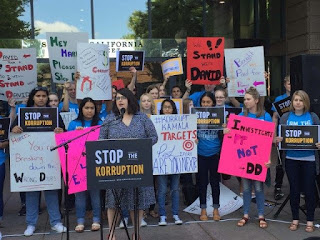What would a “non-political” movie about abortion look like?
Elle magazine recently published an interview with filmmaker Tracy Droz Tragos, whose documentary Abortion: Stories Women Tell premieres at the Tribeca Film Festival later this month. The Elle article is entitled: “Is This the First Non-Political Movie About Abortion?”
I don’t have access to the film, of course, but my sneaking suspicion is that the answer is no.
The project does sound intriguing. Tragos supports abortion; she says that one of her goals for the film is to offer an “intimate look” at why women “need” abortions. But to her credit, she includes pro-life women in the documentary, and tells Elle that her pro-life subjects demonstrated “compassion. I don’t think these are unfeeling people. They’re not coming at this from an evil place.”
So there is some attempt at balance. It might not be a pro-choice movie, necessarily. But that doesn’t mean it isn’t a political movie.
The fact that the only people deemed worthy of an interview are women of reproductive age—women who could have abortions, even though some would refuse—is highly political. It implies that abortion affects only one person. Thus this introduction from the Elle piece:
[D]ocumentarian Tracy Droz Tragos wonders whether we’ve really listened to the people whose opinions matter most.
“It’s always women that I want to give voice to—women who are affected,” Tragos told me last week. “For me, that’s the bottom line.”
Would Tragos consider Melissa Ohden and Gianna Jessen to be women affected by abortion policy? They were both born alive after “failed” saline abortions.
What about male abortion survivors? What about fathers of aborted children? What about people (of whatever gender) who are alive today because pro-life advocates helped their mothers during pregnancy? Just to name a few.
Of course, a documentary providing voices to all of these categories of people would have an implicit message of its own: namely, that abortion has a wide-ranging effect on society that goes beyond pregnant women. That’s at odds with the belief that abortion is merely a personal decision, so a pro-choice viewer would likely object to my framing as “political,” just as I object to Tragos’ framing.
Perhaps the reason we still await the first non-political movie about abortion is because such a movie is impossible.



Leave a Reply
Want to join the discussion?Feel free to contribute!